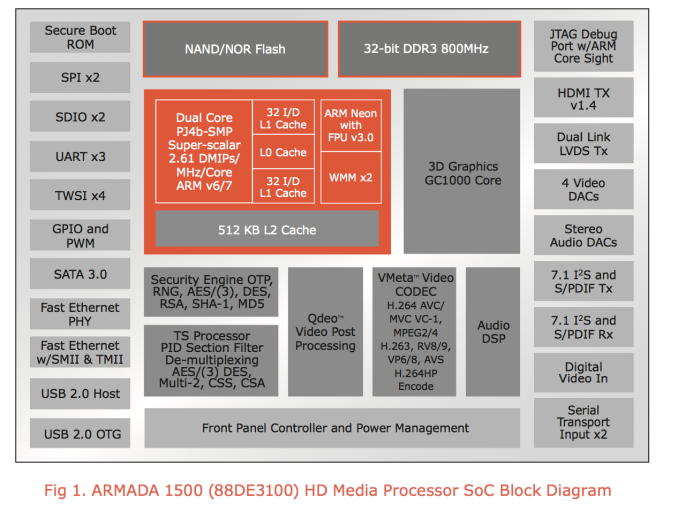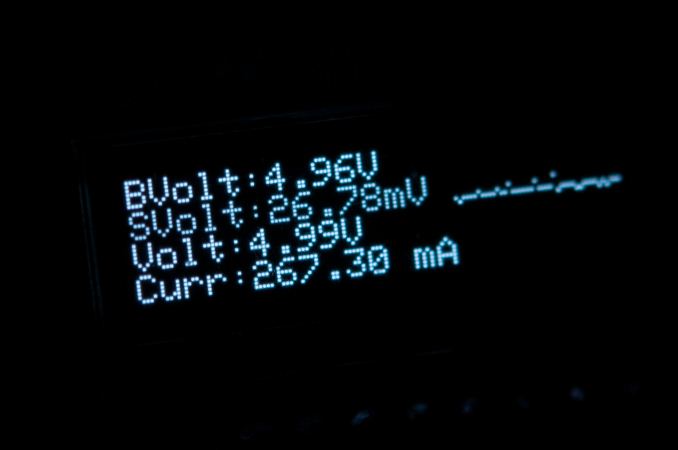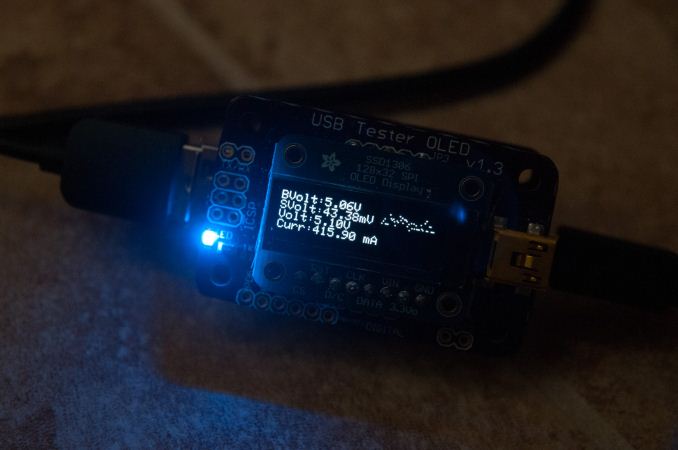Google Chromecast Review - An Awesome $35 HDMI Dongle
by Brian Klug on July 29, 2013 9:45 PM EST- Posted in
- Smartphones
- Media Player
- Android
- Mobile
- HDMI
- Chrome
- Tablets
- Chromecast
Inside Chromecast
Inside the Chromecast it’s also a simple affair, I took a look at the FCC disclosure for the Chromecast which had internal images up right after the event, and noted inclusion of a Marvell 88DE3005 SoC and AzureWave NH–387 WiFi combo chip. On the backside is 512 MB of Micron DDR3L memory and 2 GB of flash. The antenna for the WiFi combo is printed on the PCB off to the side, there’s no diversity or anything special, just a single PCB antenna.
The Chromecast supports just 802.11b/g/n (2.4 GHz), sadly no 5 GHz is included. That’s somewhat alarming if you’re in an area where 2.4 GHz is congested to the point of being unusable (just about any major urban area), and even more so since streaming applications demand a good QoS for good experience. I have no doubt that 2.4 GHz-only was chosen for cost reasons here, but I would’ve gladly paid $5–10 more for 5 GHz and eliminating that as a potential problem.
Best I can tell, the Marvell 88DE3005 is a cut down, perhaps binned version of the 88DE3100 SoC that has shipped in Google TV for some time now with just a single CPU core enabled. Some hacking done by enthusiasts has confirmed from /proc/cpuinfo that only a single core is visible to the OS, and that the Chromecast also interestingly enough really runs Android, not Chrome, and includes a build.prop file like you’d expect an Android device to.
Google no doubt chose this Marvell SoC in part thanks to the presence of hardware VP8 decode, and I have no doubt YouTube on the device brings down VP8 versions of videos when available, and the Chrome tab to Chromecast streaming uses VP8 as well. Of course there’s hardware decode of H.264 High Profile onboard as well for Netflix and other YouTube videos without VP8 versions. Google lists the supported codecs on their Google Cast SDK page.
Back when the power situation was unknown and still steeped in conflicting information about HDMI power delivery (again, it can't be powered by MHL-HDMI ports which can supply up to 500 mA at present spec, and HDMI doesn't supply enough current, just 50mA), I set about measuring power. I have a handy USB power meter which sits in line with devices and shows a small graph as well as data on its OLED display. I stuck the meter in line between the microUSB power supply provided with Chromecast, and the Chromecast, and measured around 420 mA at peak while decoding either a 1080p Netflix stream or Chrome tab streamed to it, and around 250 mA at idle. All of those are at 5 V, so at peak the Chromecast draws around 2 watts, at idle around 1 watt. Of course if the Chromecast is plugged into your TV’s USB port, chances are when the TV is off power is cut to USB, so idle really is completely off. It’s obvious to me that Chromecast definitely leverages that hardware decoder for both VP8 and H.264 processing to get these very low power numbers.


-004_575px.jpg)
-003_575px.jpg)











105 Comments
View All Comments
savagemike - Tuesday, July 30, 2013 - link
You have to realize there is a broader market for this stuff then straight up geeks. Half the population is using smart phones - which doesn't even say anything about tablet usage. How many of that set do you think also has a media collection on dlna servers? You think that is about half the population?This simply might not be a product directed at you.
Also it is probably a matter of weeks before plex has this enabled. I would imagine by Christmas there will be several avenues available for media geeks with home collections to use chromecast. And that is completely aside from the mirrored screen casting features.
mitcoes - Tuesday, July 30, 2013 - link
Thanks for the article. Excellent first version of this product but as I decided not to be more an early adopter I'll wait for the Chromecast 2 or 3 with all the features it should have the first version.As WiFi 5Ghz VP9 hardware decoding ethernet, Miracast 1080p or even 4k mentioned here - artilce + comments - . The price is the best.
And If I where a TV brand I would put inside my models something compatible - same software - but with this better features I wrote before as it seems this time Google TV is betting to be the new TV standard with or without chromecast and as we know standards - even if they are worse - usually win
ThortonBe - Tuesday, July 30, 2013 - link
Love the Grasshopper screen shot.rDeck - Tuesday, July 30, 2013 - link
"After spending a week tearing my hair out over Miracast (which frankly has the worst interoperability in the entire industry)"Could you provide some insights on your experience with the bad interoperability of Miracast?
I would be interested, because so far only very few devices are certified for Miracast, but those which are certified worked quite well for me until now...
rDeck - Tuesday, July 30, 2013 - link
Oh, except that Samsung "AllShare" dongle I just remembered. They somehow upgraded the firmware of it to support Miracast somehow, but despite having it certified, they officially don't really support Miracast...Popolon - Tuesday, July 30, 2013 - link
You can find the same kind of device by chinese maker, called something like 'miracast keys' for $10 or a little more since few month. Google only rebranded them and rise a little the price.amicrozen - Tuesday, July 30, 2013 - link
Thanks for the detailed review so quickly.Google is on the right track, but I will wait for it to mature.
zepi - Tuesday, July 30, 2013 - link
So this is googles Nth attempt to own content distribution channel over internet to peoples TV sets. Q and google tv etc...They seem to want it real bad.
YellowWing - Tuesday, July 30, 2013 - link
Brian - You might try adding the Google version of the Chrome Remote Desktop extension to get full screen going. I would definitely give it a try.relentlessfocus - Tuesday, July 30, 2013 - link
Not a biggie but its a shame it doesn't support 5ghz wifi. Slightly complicates things for those of us who have escaped 2.5ghz limitations